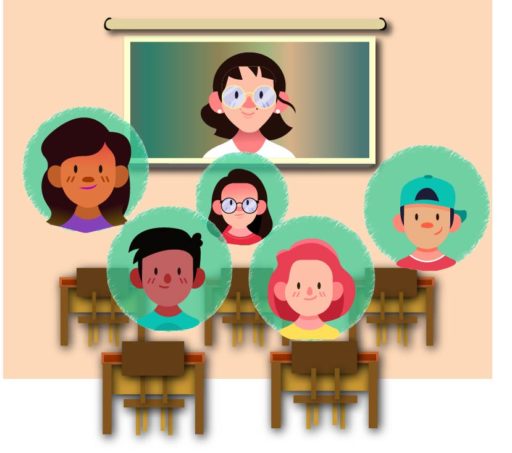City College Goes Digital
By Tyler Breisacher
tbreisac@mail.ccsf.edu
Staff Writer
Instructors across City College have moved most of their classes online to maintain social distancing and reduce the risk of spreading the COVID-19.
K-12 classes taught through SFUSD are going online too, with the district lending laptops to some students. During an April 7 virtual town hall, City College Board of Trustees President Shannell Williams said the college was working on a similar program for City College students. Those wanting to borrow a laptop for the remainder of the semester can reach out to their instructors.
Some classes may run quite differently without the benefit of face-to-face interaction, but many instructors are optimistic that the shift to online learning will go well.

Philippine Studies Department Chair Lily Ann Villaraza said she was grateful for the week-long period of time that instructors were given to plan the transition to online learning. “I have colleagues at other institutions who were given a weekend or just a day to figure it out,” she said.
While she hopes this process will go well, she emphasized that instructors teaching online during this emergency situation will not necessarily be properly trained to do online learning long term.
“My hope is that there is recognition, because of this move, that online learning does not work for everyone and we have to serve our student populations in various ways to support their learning processes,” she said. “This crisis will also make clear our need to provide more and better access to technology for our students as a whole – and the training needed to navigate it.”
Some classes will require significant changes in order to function online. Cinema Department instructor Caroline Blair teaches a directing class, which usually involves students directing scenes with two or more actors. It’s possible to do that over Zoom or other video conferencing software, but it’s hardly the same experience as doing it face-to-face.
“It can be kind of an intimate experience, in that everybody is listening and everybody is attempting to go a layer deeper in terms of performance,” she said. “It’s going to be difficult not to do that in person.”
Despite the challenges, Blair remained optimistic. “We’re in good spirits in light of everything,” she said. “Nobody’s grumbling, everybody’s really putting their best foot forward.”
City College student Dale Smith, working toward certificates in sexual health and community mental health, has struggled with online classes before. He decided to drop his English class after it switched to an online format. Smith said his teacher moved the class online right away, rather than first taking the week-long training from the Distance Education Department. In that first week, students were asked to post on Canvas during the regularly scheduled class time rather than at any time during the week which might be more convenient for students.
“Unfortunately, he didn’t fully understand how to use Canvas so a lot of stuff wasn’t as clear as I would have liked it to be,” Smith said. “Assignments weren’t in the place where they usually were, and overall the instructions weren’t as clear as I would have liked them to be.”
Even though he dropped that class, he’s continuing with his other classes.
“I can tell that the other instructors took the time to try and figure out the platform,” he said. “I still have some reservations about learning online and there are some big challenges to doing so, but I’m hoping that I’ll be able to succeed with online classes if I put in the time and effort.”
The Distance Education department provided instructors with training on online teaching, primarily during the week of March 16. LGBTQ+ Studies Department Chair Ardel Haefele-Thomas said that week was “nothing short of heroic on the part of Distance Education faculty, staff, department chair, and dean!”
In addition to moving his classes online, Labor Studies Department Chair Bill Shields helped out students by distributing information about resources that are available to students, such as student health services, and state unemployment compensation.
Shields was somewhat concerned about possible long-term changes resulting from the sudden shift to online learning. He said there was already a push to move classes online in order to save money — online classes often have larger class sizes. The administration may try to take advantage of this crisis to push that agenda. “Powerful people and corporations will take advantage of crises to try and drive through agendas that they were not yet able to carry out,” he said, referencing New Orleans converting nearly all its schools to charter schools right after Hurricane Katrina.
“I think we’re right to be concerned about the disaster capitalism version of moving too much of what we do online,” he said. “And we’re just going to have to be mindful about it, and especially speaking through our union, make sure that that doesn’t happen.”
Villaraza also emphasized that the move to online teaching is a “temporary emergency situation” and that faculty should not be expected to keep their classes online indefinitely. In fact, many instructors would not be able to continue teaching online since they haven’t done the required training, she said.
Updates from the college, answers to frequently asked questions, and other resources are available at ccsf.edu/community.html
